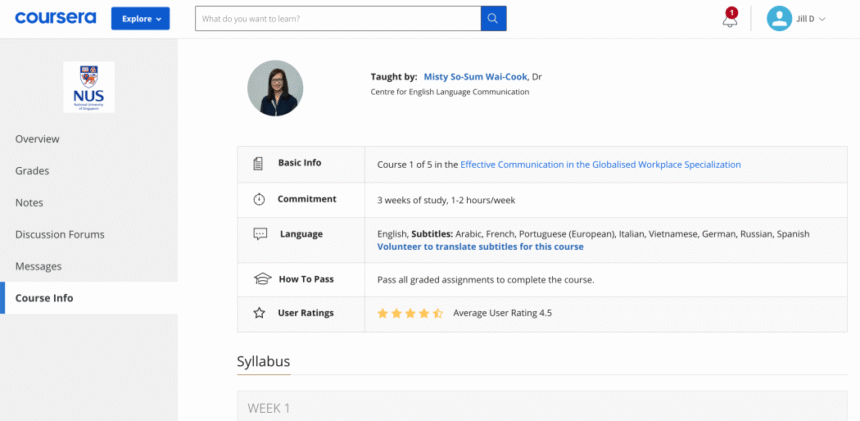Coursera Courses Review: Your Ultimate Guide to Online Learning
In today’s fast-paced world, acquiring new skills and knowledge is essential for staying competitive. Coursera is one of the most popular online learning platforms that provides access to high-quality courses from top universities and organizations worldwide. In this detailed review, we’ll dive into what Coursera offers, its strengths, and how you can make the most of your learning experience.

What is Coursera?
Coursera is an online education platform that partners with top universities and companies to offer courses, certifications, and degree programs. Founded in 2012, Coursera has grown rapidly and now offers over 4,000 courses in subjects ranging from computer science to humanities. The platform serves millions of learners worldwide, providing opportunities for anyone to gain knowledge, no matter where they are.
Key Features of Coursera:
-
Wide Range of Courses: With courses available in subjects like business, technology, arts, and health, there is something for everyone on Coursera.
-
University and Industry Partners: Coursera collaborates with prestigious institutions such as Stanford, Yale, and Google to provide high-quality content.
-
Flexible Learning: Coursera’s courses allow you to learn at your own pace, making it easier to fit studying into your busy schedule.
-
Free and Paid Options: While many courses are free to audit, you can also earn a certificate for a fee, which can add value to your resume.
Coursera Courses: A Deep Dive
1. Course Variety and Quality
One of the standout features of Coursera is the sheer variety of courses it offers. Whether you’re interested in data science, programming, or psychology, you can find a course that suits your needs. These courses are created and taught by experts in the field, ensuring that you receive high-quality education.
Popular categories include:
-
Technology: Courses in programming, AI, and cloud computing.
-
Business: MBA-level content, leadership, entrepreneurship, and marketing.
-
Data Science: Learn data analysis, machine learning, and statistical modeling.
-
Arts and Humanities: Philosophy, literature, and history courses.
-
Health and Medicine: Courses on public health, anatomy, and medical technology.
For example, Google’s IT Support Professional Certificate on Coursera is designed for beginners looking to enter the IT field, offering a comprehensive introduction to the essentials of technical support.
2. Coursera’s Learning Structure
Coursera courses typically include video lectures, quizzes, and assignments. These elements work together to ensure that you don’t just watch videos, but actively engage with the material. The peer-reviewed assignments provide an opportunity to get feedback and improve your work.
Many courses also include a discussion forum where you can ask questions, interact with fellow students, and gain insights from instructors. This creates a rich learning environment and fosters a sense of community.

3. Certificates and Degrees
While you can audit most courses for free, if you want to earn a certificate, you’ll need to pay for the course. These certificates are issued by the course provider (usually a university or company), and you can showcase them on your resume or LinkedIn profile.
Additionally, Coursera offers degree programs in collaboration with universities, allowing you to earn an accredited bachelor’s or master’s degree online. This makes Coursera a solid choice for those seeking formal education in a flexible, online environment.
4. Pricing and Plans
Coursera offers several pricing options depending on the type of course you choose:
-
Free Courses: You can access many courses for free, but you’ll need to pay if you want a certificate.
-
Specializations: Coursera offers specialization tracks, which are collections of related courses designed to help you develop a deeper understanding of a subject. These require a monthly subscription (usually around $39-$79 per month).
-
Degree Programs: Prices for degree programs can vary, but they are typically much cheaper than traditional university degrees.
5. Mobile Learning and Accessibility
Coursera makes learning on-the-go easy with its mobile app. You can download course videos to watch offline, take quizzes, and keep track of your progress right from your phone. This feature is perfect for students who need to make the most of their spare time while commuting or traveling.

How to Make the Most of Coursera
1. Choose the Right Course for Your Goals
With thousands of courses available, it can be difficult to decide which one to choose. To make the most out of Coursera, start by setting clear learning goals. Ask yourself:
-
Do you want to improve your career prospects?
-
Are you interested in gaining knowledge in a new field?
-
Are you looking to upskill in your current job?
Once you have a clear goal in mind, you can choose the courses and specializations that best align with your objectives.
2. Stay Consistent
Online learning requires discipline. It’s easy to fall behind when studying at your own pace, but consistency is key. Coursera’s flexible learning allows you to set your own schedule, but it’s important to stay committed and stick to it. Consider setting aside time each week to complete lectures and assignments.
3. Engage with the Community
Most Coursera courses have discussion forums where you can interact with other learners and instructors. Engaging in these forums is a great way to deepen your understanding of the material and gain new perspectives.
4. Get Certified
If you’re serious about improving your career prospects, earning a certificate can give you an edge in the job market. Many courses offer certificates upon completion, and these can be added to your resume or LinkedIn profile.
Pros and Cons of Coursera
Pros:
-
High-quality courses from prestigious universities and companies.
-
Flexible learning that fits around your schedule.
-
A wide range of free and paid options.
-
The ability to earn a certification or even a degree.
-
Mobile app for learning on the go.
Cons:
-
Some courses require payment for certificates.
-
Degree programs can be expensive.
-
Not all courses offer the same level of interaction or personalized attention.
FAQs About Coursera
1. Are Coursera courses really free?
Yes, many Coursera courses can be audited for free, but you will need to pay if you want a certificate.
2. How long do Coursera courses take?
The duration of a Coursera course depends on the course itself. Most courses are designed to be completed in 4-6 weeks, but you can take longer if needed since many are self-paced.
3. Can I earn a degree on Coursera?
Yes, Coursera offers fully online degree programs in collaboration with universities. These programs are typically more affordable than traditional degrees.
4. Is Coursera worth it?
Coursera is definitely worth it if you’re looking to learn new skills, get certified, or pursue a degree online. The flexibility, quality of content, and potential career benefits make it a great investment.
Conclusion
Coursera is a powerhouse in the world of online learning, offering courses that cater to both beginners and advanced learners. Whether you’re looking to start a new career, gain knowledge in a specific field, or earn a formal degree, Coursera provides the tools and resources to help you achieve your goals. With its flexible learning options, high-quality content, and world-class instructors, Coursera is an excellent choice for anyone looking to invest in their education and future.
If you’re ready to dive into the world of online learning, start your journey with Coursera today!











